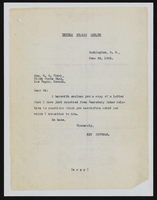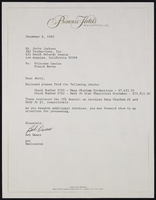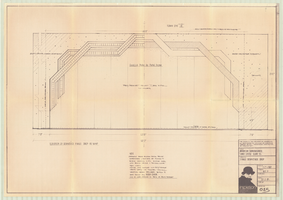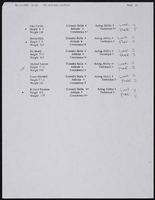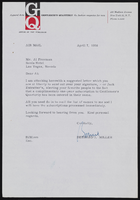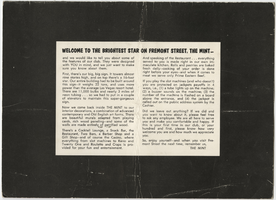Search the Special Collections and Archives Portal
Search Results
Jane Overy oral history interviews
Identifier
Abstract
Oral history interview with Jane Overy conducted by Claytee D. White on August 17 and December 20, 2023 for the Boyer Early Las Vegas Oral History Project. In this interview, Overy discusses her museum work, early life, and many civic projects she has participated in over the years. Overy grew up in Kansas, where she spent time playing pool (billards) and spending time outdoors. After high school, she joined the United States Air Force and served in Alaska where there were two women, each with a private guard. Additionally, she worked as a newspaper reporter and as an entertainer who sang around the world. Overy served in the military for four years. In 1981, she moved to Nevada and desert climate for the improvement of her overall health. Over the years, her work and civic projects connected her with Senator Harry Reid, the Walking Box Ranch, the Searchlight Nugget Casino, and many other experiences.
Archival Collection
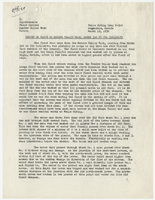
Report on flood in Meadow Valley Wash, March 3rd to 5th inclusive, March 12, 1938
Date
Archival Collection
Description
Summary of the damage from a flood in the Moapa Valley on March 3-5, 1938
Transcribed Notes: Transcribed from handwritten text on pg. 3: "West of the Flood Channel and on west side of Highway except for a few acres west of Highway and East of Channel in Logandale above point where Highway bridge crosses Channel. # 10 acres early vegetables were silted over lightly making them unfit for shipment. About 5-10 acres will need re-leveling. One of the most important aspects of the entire experience, that of the supervisory personnel getting this lesson which could not be learned without just such an object lesson."
Text

Jessica Anderson oral history interview: transcript
Date
Archival Collection
Description
Oral history interview with Jessica Anderson conducted by Claytee D. White on March 7, 2019 for the Remembering 1 October Oral History Project. Anderson begins talking about her early life, family, work history, and the reason why she had moved to Las Vegas, Nevada in 1991. She goes on to talk about the history of Outdoors Nevada where she currently works, and what she was doing the day of October 1, 2017. Anderson recalls how she found out about the shooting, reaching out to friends, and learning more about what happened that night. Anderson talks about the aftermath of the event, how it affected everyone involved, and the healing aspect afterwards. Lastly, she describes the process of creating the Healing Garden, the features of the garden, and the future plans for the area.
Text

Transcript of interview with Chic Hecht by Julie Sefman, April 2, 1976
Date
Archival Collection
Description
Interview with Chic Hecht Julie Sefman on April 2, 1976. In this brief interview, Hecht talks about his time in the state senate working to bolster the budget with sales tax and gaming tax, starting a community college and health programs. He also talks about Pop Squires, a newspaper man and advocate for building Hoover Dam, who had a home on the site of Chic Hecht's clothing store on Fremont Street. Hecht also describes his time in the military and his involvement with the Military Intelligence Association.
Text

